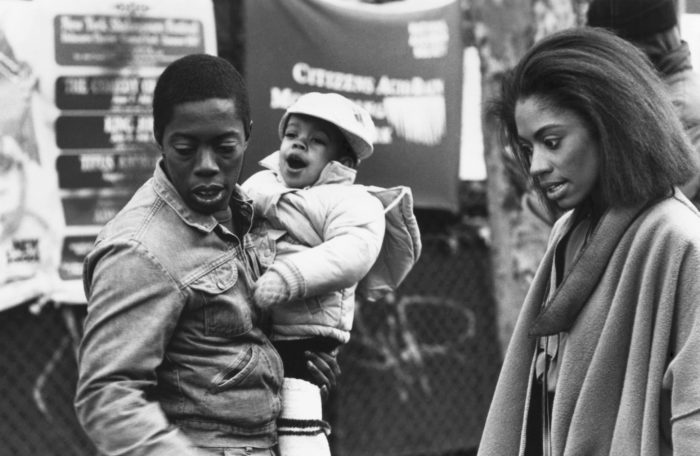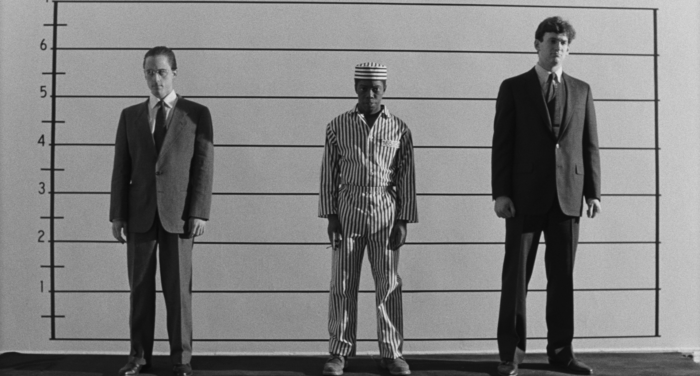
And I thought it was hard to avoid comparing Bless Their Little Hearts to Bicycle Thieves! Sidewalk Stories has so much in common with Charlie Chaplin’s The Kid it might as well be a remake. Both are silent black and white movies about a lovable but destitute man whose life changes for the better when he takes responsibility for an abandoned child. The nearly 70 years between these movies did create some gulfs that differentiate them, but the joy both bring seems a bit more universal.
The Artist (writer-director Charles Lane) is a man trying to get by in Greenwich Village by drawing portraits on the street. When we first meet him, we see him battle another artist for a spot on the sidewalk; a one-sided fight given that the other guy is about twice as big as the artist. At night, the artist lives in an condemned and crumnbling church which he enters through a hole in the wall and must tie lose wires in the wall together for light. His struggle is not unique, Lane makes sure to show us the other men trying to make a living performing magic and dancing in the Village and even the fancy men in suits fighting each other for a cab up in the financial district. It’s a dog eat dog world, this New York City.
One night, the artist witnesses a murder that leaves the victim’s young daughter abandoned in an alley. While his first impulse is to go to the police for help, the artist decides it’s not worth the risk that the cops consider him a suspect in the murder. So he decides to look after the child (who is played by Nicole Alysia, Lane’s real life daughter) while searching for her mother, of whom he only has a photograph to go on. In the meantime he has to learn to be a surrogate father to the child, and feeding and clothing her won’t be easy, given he can barely do that for himself.
On his quest to take care of this child, the artist encounters many folks who are willing to help or hurt him given his circumstances. A friendly small business owner flirts with the artist and offers him free toys for the child, while the other mothers at the playground recoil at how he’s raising his child. Most surprisingly, the artist finds out that yuppies are willing to pay a lot for the child’s art. But every rose has it’s thorn, and the possibility that the child could be a moneymaker brings the attention back of her father’s murderers, who hatch their own devious scheme.
So Sidewalk Stories is a movie more about class than it is race, with a pretty clear “capitalism is ruining everything” attitude. I don’t think it’s a big leap to assume the silent nature of the movie is a metaphor for how homeless people do not have a voice in our society. Which is why the ending scene feels less powerful and more inevitable, but if you haven’t guessed what that last trick is I won’t spoil it here. I’ll just say that calling the main character “the artist” is not the only thing Sidewalk Stories has in common with that 2011 film.
It’s hard to quantify the experience of watching this kind of movie. 97 minutes is a long time to not have any dialogue, Sidewalk Stories doesn’t even use interstitial, it is completely without words. On one hand, it demands your attention and brings you into the movie, letting you fill in the blanks yourself to make these characters whole. But on the other hand, I felt like the movie had me too much in my head, like it wasn’t doing enough to fully engage me in the experience – it was easy to start mentally writing this review as the movie went on. Marc Marder’s score is great and occasionally diegetic, but it, like the rest of the movie, felt like it missed an opportunity to be more modern in its approach.
Then again, that’s clearly not the goal of this low-budget film. Along with a limited release, Sidewalk Stories ended up debuting on PBS and brought it plenty of praise from those who saw it. It was also, to my surprise, one of the first movies to have Edie Falco in it. By all accounts, this movie walked a tightrope and came out a miraculous success. So don’t let my laziness when it comes to watching silent movies and my slight discontent in how this film addresses class stop you from taking a chance on it. You might find yourself absolutely delighted.


